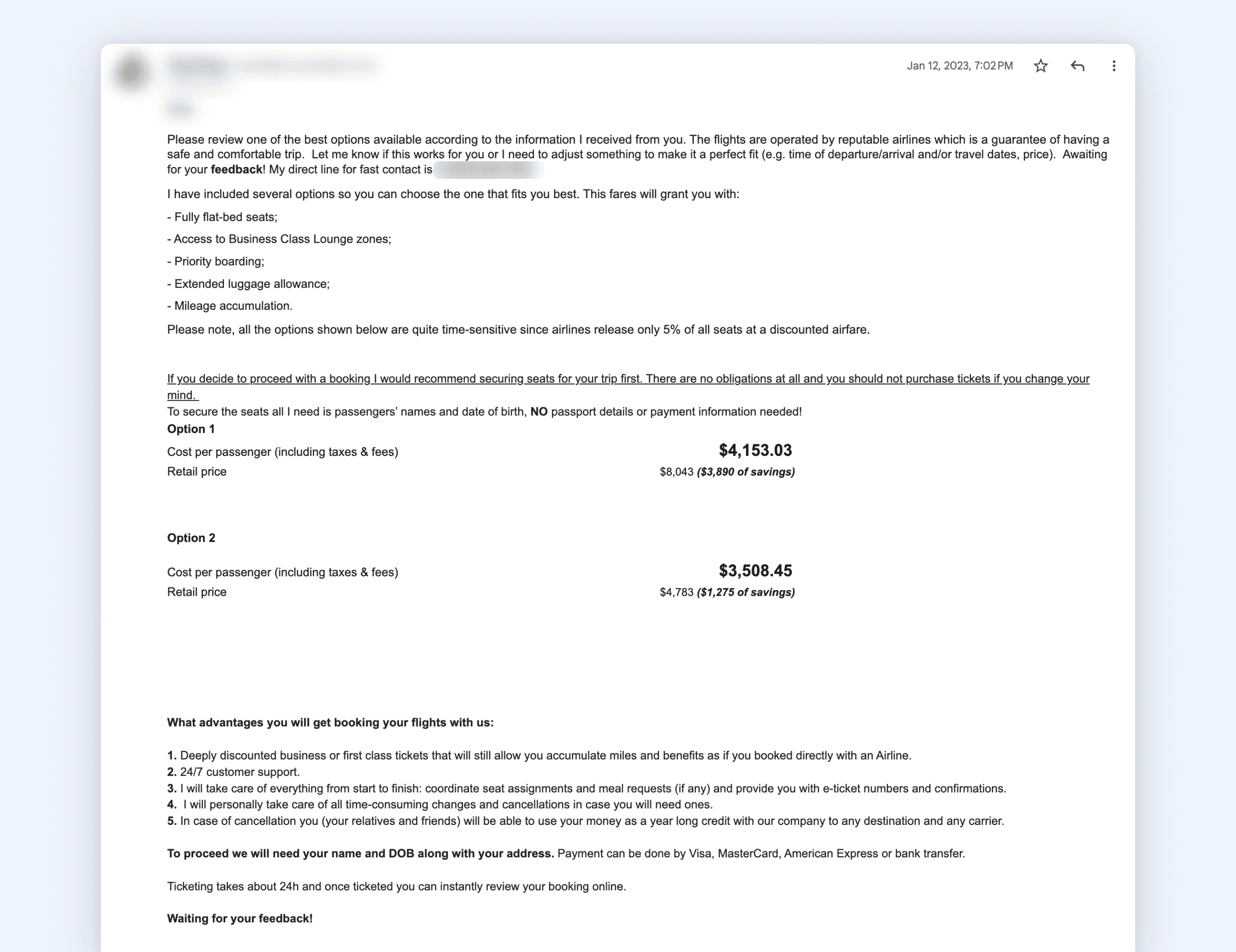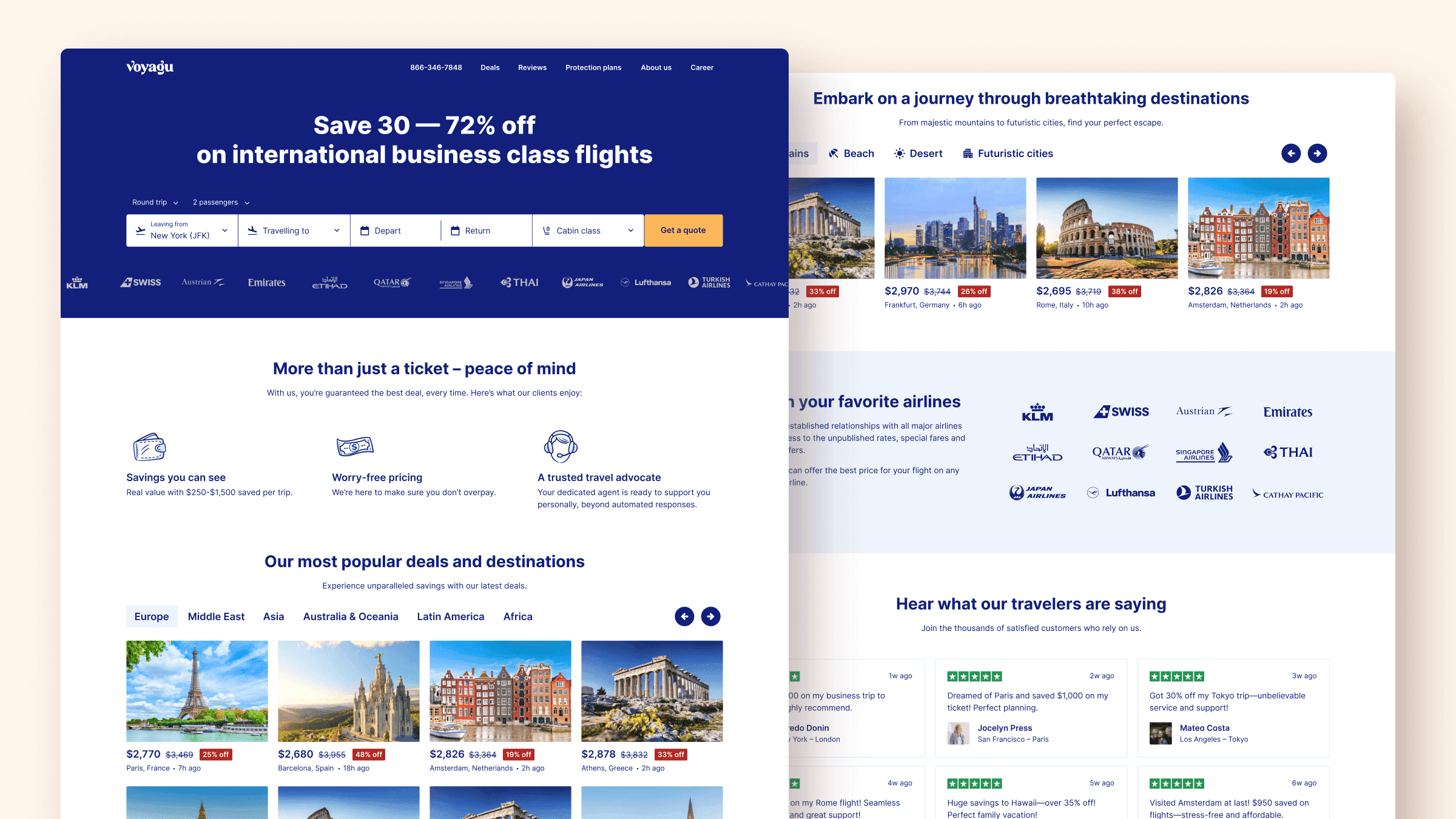Context
Voyagu is a San Francisco–based TravelTech startup focused on premium international travel, serving an audience of more than 100,000 travelers and generating over 50 million USD in annual revenue. The company operates in the business and first-class flight segment, where customers expect high-touch service, reliability, and personalized support.
The core audience consists of US travelers aged 55 and older who typically book complex international itineraries through a live travel agent rather than self-service systems. They value trust, clarity, and human support, but historically lacked transparent digital tools. Communication happened via phone calls and long email threads, with no client portal, no trip status tracking, no secure data exchange, and no unified interaction history. This created friction for both customers and the business.
Internally, teams worked across disconnected systems for sales, flight search, ticketing, billing, and communication. Processes were fragmented and error-prone, slowing down operations and limiting scale. To grow efficiently, the company needed a unified CRM platform integrating sales, customer interaction, document management, payments, and the full lifecycle of a trip.
A strategic goal was also to build technology that could eventually be offered to other travel agencies, similar to how Uber expanded by providing its infrastructure to external partners. Radar, the internal CRM platform, was envisioned not only as Voyagu’s operational foundation but also as a future standalone product.
Year
2022 – 2025
Client
Voyagu
Challenge
The main challenge was to simultaneously address two strategic blockers holding the business back.
First, Voyagu needed to create a digital experience that would earn the trust of an older premium audience. Customers wanted to see booking status, request history, final pricing, and transfer personal data securely, but no infrastructure existed to support this.
Second, the company lacked a unified operational system. Sales, search, ticketing, and billing teams worked in different tools, slowing down the entire chain from fare search to ticket issuance. Manual work caused errors, high operational costs, and made it impossible to scale.
To grow and reach a new level of efficiency, Voyagu needed to rethink the entire travel workflow end-to-end: from first contact to final ticketing. The business required a single technological foundation that would provide transparency for customers, speed for agents, and the flexibility to offer the CRM to external agencies as a future TravelTech product.
Approach
We began by immersing ourselves in real customer needs and analyzing the company’s key operational processes. We studied interaction scenarios, communication logs, decision-making structures, and the full operational chain across all teams involved in trip delivery. This allowed us to form a holistic picture of the experience needed for both customers and the business.
To deliver this vision, I structured the design function as a unified product team, bringing together product, communication, and web designers, as well as researchers. We established shared principles, processes, and quality metrics, ensuring design alignment with the goals of marketing, sales, TravelTech, and operations.
Based on the analysis, we defined two strategic product directions: Client Portal as the foundation of the customer-facing digital experience, and Radar CRM as the operational core structuring the entire company around the lifecycle of a trip.
We developed a unified design system covering both products: components, visual principles, behavioral patterns, accessibility requirements, and brand consistency across the ecosystem. This accelerated development, improved interface coherence, and created a cohesive product identity for Voyagu. Additionally, we introduced AI tools that significantly reduced the time required to create interfaces and content, enabling faster iteration and delivery.
Impact
Work across the three strategic directions produced a systemic impact on both business and operations.
Business Class Consolidator accelerated campaign production 3x, increased website conversion by ~30%, and improved paid channel efficiency: engagement grew by ~25%, and CTR in key campaigns doubled. AI tools also reduced content and creative production time 3x.
Client Portal transformed the experience for premium travelers, shifting a large portion of interactions to a digital format and delivering stable ancillary revenue growth to ~260 USD per booking, with upsell share reaching ~20% and tips ~38%.
Radar CRM reduced average booking completion time by ~40%, improved cross-team coordination, and lowered error rates through a unified trip-centric workflow and automation of routine tasks.
For the design organization itself, the results included the formation of a strong product team working at the strategic level and integrated into decision-making across the company. A unified design system enabled parallel development of multiple products, while a culture grounded in data, research, and a deep understanding of human experience ensured consistent speed and quality.
As a result, Voyagu not only accelerated its performance metrics but also built long-term infrastructure, processes, products, and culture, that scale with the company and create a durable competitive advantage.












